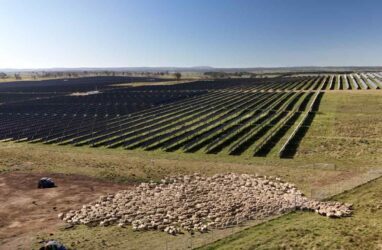Feed aggregator
Saving a species: The slow return of the Iberian lynx
Saving a species: The slow return of the Iberian lynx
Woodside submits Browse CCS plans with Australian federal department
Relentless warming is driving the water cycle to new extremes, the 2024 global water report shows
Australia’s biggest coal state breaks new ground in wind and solar output
The post Australia’s biggest coal state breaks new ground in wind and solar output appeared first on RenewEconomy.
'Humans are all they know' - Fate of whales uncertain as marine zoo shuts
'Humans are all they know' - Fate of whales uncertain as marine zoo shuts
Lab-grown meat is the future for pet food – and that’s a huge opportunity for Britain | Lucy McCormick
While the EU and US hesitate, the UK can become world leader in this burgeoning – and cruelty-free – innovation
If the pet food industry were a country, it would rank as the world’s 60th biggest emitter of carbon dioxide. In countries such as the US, researchers estimate that pet food accounts for about a quarter of total meat consumption. And as the number of pets grows, the environmental impact looks set to increase. But the British government may have unlocked a solution. This year, the UK became the only country in Europe to approve the use of lab-grown meat in pet food.
Lab-grown meat may sound futuristic, but the process is actually straightforward. It starts with the harvesting of a small number of animal cells, then the cells are fed essential nutrients to help them replicate and grow, similar to a yeast culture on a petri dish. But unlike a whole living animal, there are fewer limitations on size, there are no welfare concerns, and the setup does not require such vast land, water and energy resources.
Lucy McCormick is an analytics manager at the Guardian and a writer on economics, politics and current affairs
Continue reading...‘Ironic’: climate-driven sea level rise will overwhelm major oil ports, study shows
Ports including in Saudi Arabia and the US projected to be seriously damaged by a metre of sea level rise
Rising sea levels driven by the climate crisis will overwhelm many of the world’s biggest oil ports, analysis indicates.
Scientists said the threat was ironic as fossil fuel burning causes global heating. They said reducing emissions by moving to renewable energy would halt global heating and deliver more reliable energy.
Continue reading...Biochar-enhanced soil could supercharge carbon sequestration, say researchers
Vermont, oil and gas industry wrangle in fossil fuel compensation lawsuits
US biodiesel, renewable diesel set for prosperous year after 2024 growth
US Treasury finalises hydrogen production tax credit rules
Climate finance alliance announces CEO-led restructuring
The Guardian view on a carbon-free economy: no just transition in sight – yet
Factory closures highlight the turbulent shift to a green economy, exposing political challenges and the urgent need for a equitable move to net zero
One of the biggest political battles of the future began to take shape in 2024, yet it did not centre on Westminster. Instead, try Grangemouth in central Scotland, Port Talbot in south Wales and Luton in the south of England. Their stories were not front-page staples, but each was of huge significance – locally, nationally and economically.
Grangemouth is Scotland’s sole oil refinery, whose owners confirmed in September that it would shut, to be replaced by a terminal taking in imported fuel – with nearly 400 workers losing their jobs. In the last days of September, the only remaining blast furnace at Port Talbot was shut down, as part of a restructuring that will cost 2,800 employees their jobs. At the end of November, staff at Vauxhall in Luton were told the plant would shut, ending 120 years of the carmaker’s association with the town and putting between 1,100 and 2,000 jobs at risk. One result was two days of protests in the town a week before Christmas.
Continue reading...



